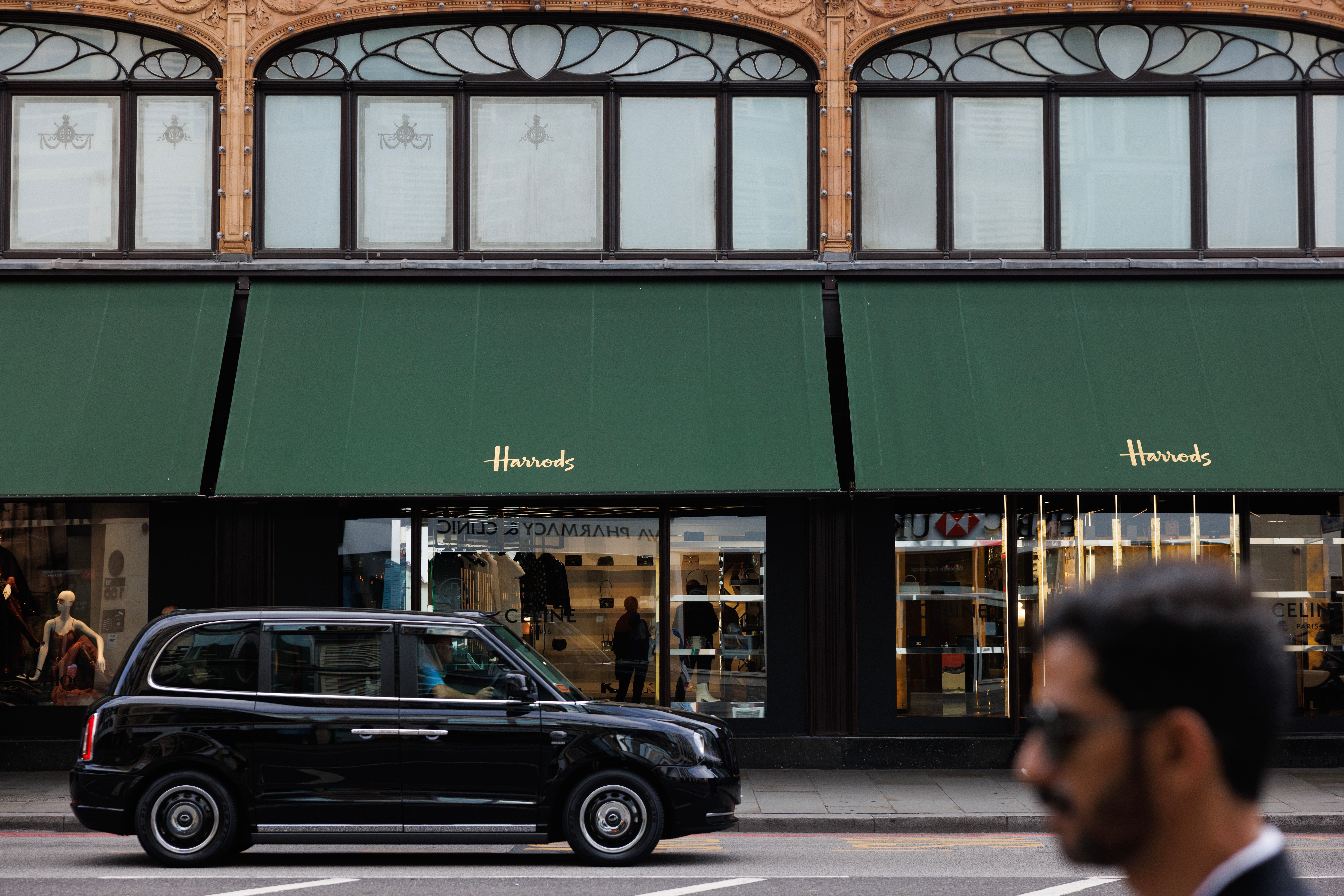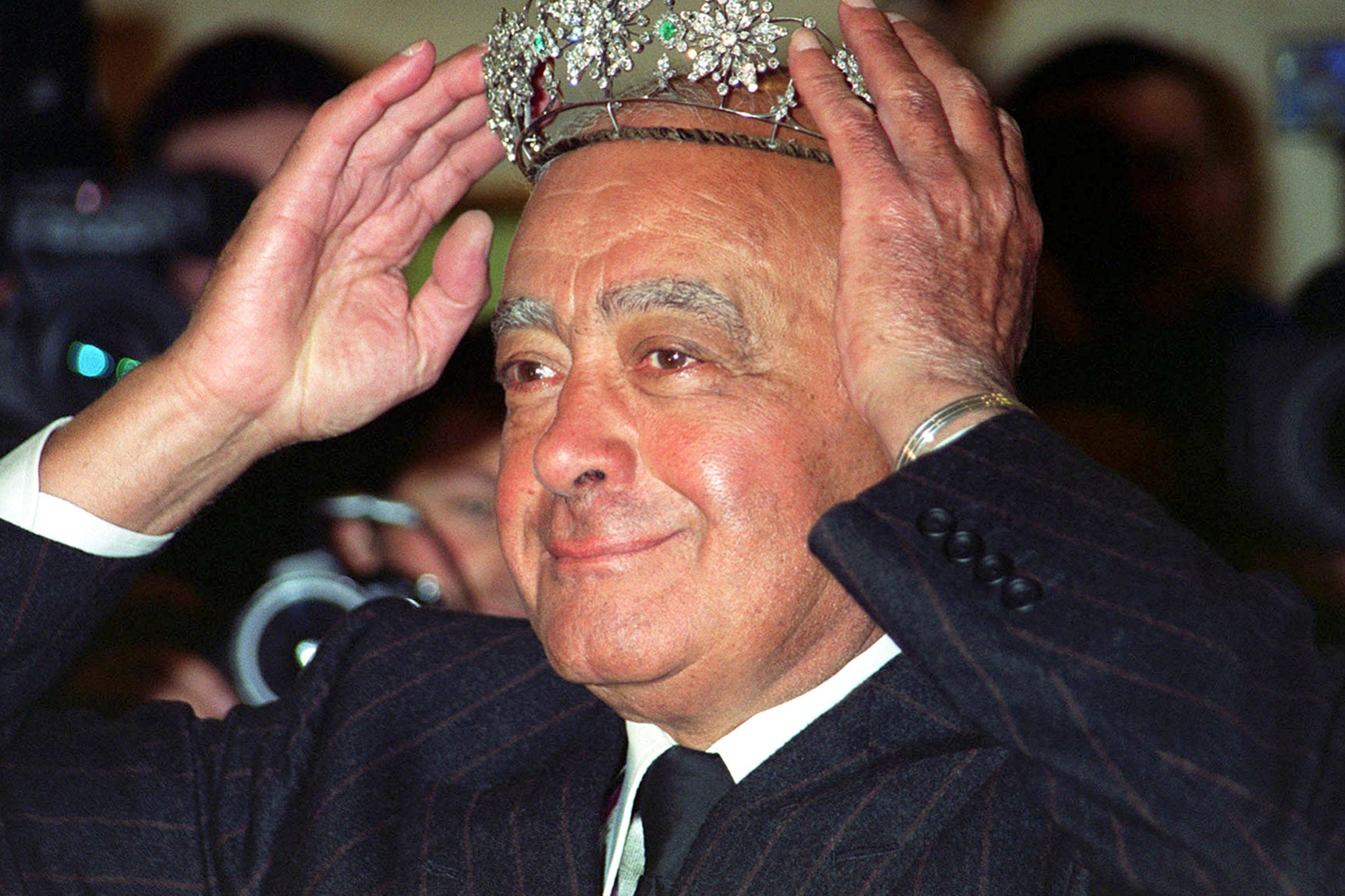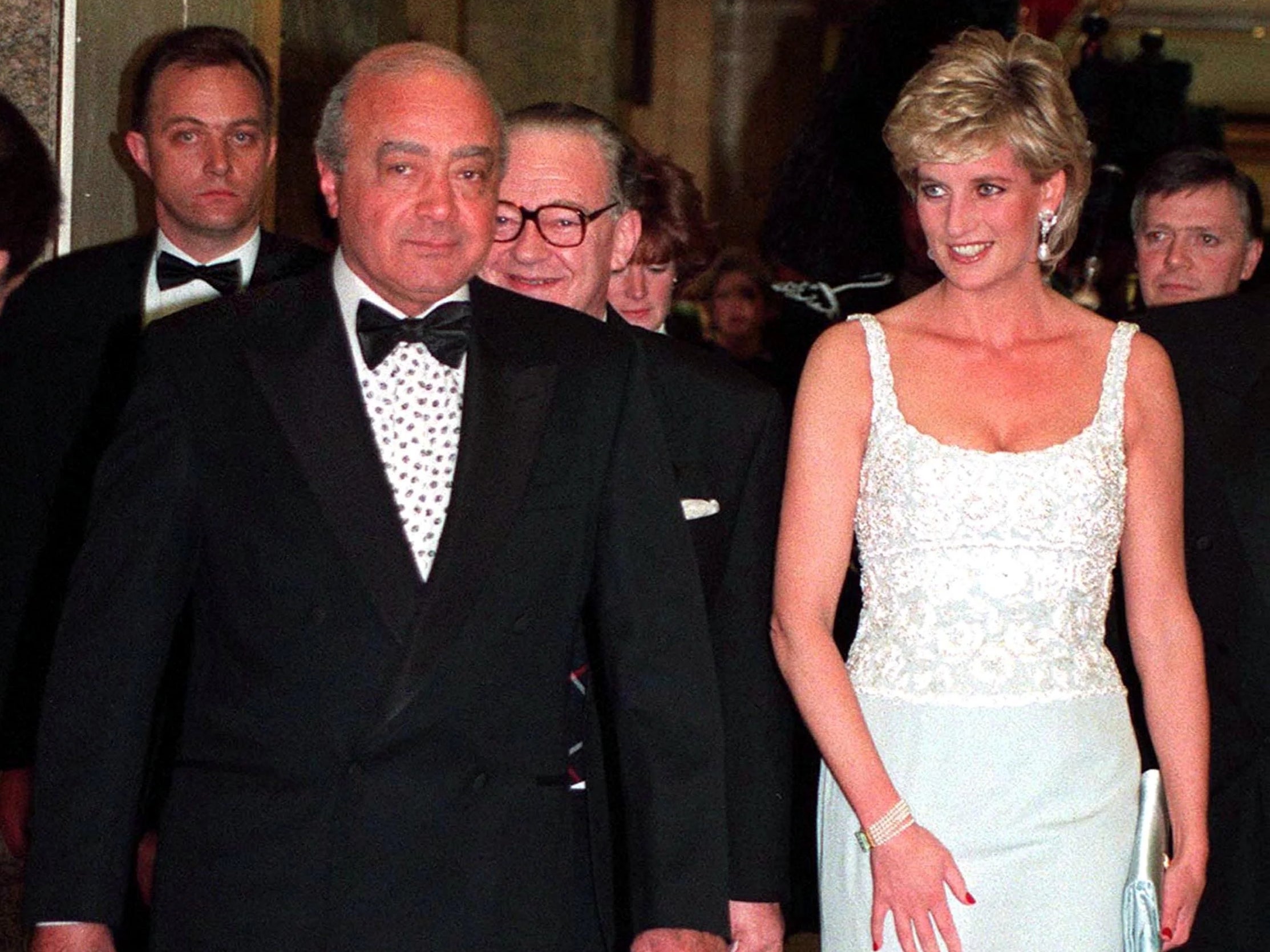How Mohamed al-Fayed got away with years of sex abuse – despite being a known predator
As London editor of Vanity Fair, Henry Porter desperately tried to expose the sex crimes of the Harrods owner as far back as 1995. Here, he tells Mark Hollingsworth how hard it was to make the accusations stick – and how the predator manipulated everyone around him with his power and influence

Wearing an extravagantly coloured shirt and smelling of heavily scented perfume, Mohamed al-Fayed walks imperiously around Harrods accompanied by bodyguards. But he is not inquiring about the luxury brands on display. He is on the prowl for attractive young women – preferably English, fair-skinned, slim, vulnerable, naive, and upper class. If a girl attracts his attention, he’ll offer her an interview for a highly paid job.
Once inside his private office on the fifth floor, she will become easy prey. Despite the light Seventies pop music in the background, the atmosphere is heavy with menace. Closing the door, Fayed propositions her almost immediately and gropes her breasts and thighs. If she refuses his advances, he tries to stuff £50 notes down her blouse. Extravagant holidays, access to a free flat on Park Lane, gifts or a luxury car are offered. Some succumb out of fear. Others run out of the office.
If they complain, they are sacked instantly or become the subject of a fake police investigation. The billionaire Harrods owner is a sexual predator. Like a mafia boss, he is using his power and wealth to abuse young girls for his sexual gratification.
The true scale of Fayed’s abuse is now becoming clear. The Metropolitan Police has revealed that a total of 111 women have accused Fayed of abuse, with the youngest victim just 13 years-old. Police are now investigating people who may have enabled his offending.
This comes after a number of victims revealed their devastating encounters in a BBC investigation, Al Fayed – Predator at Harrods. The documentary revealed how five women were raped by the Egyptian billionaire tycoon who died last year.
“I did not give consent,” one victim told the BBC. “I just wanted it to be over”. Fayed “was a monster, a sexual predator with no moral compass”, said another. “We were all so scared. He actively cultivated a culture of fear.”

Since the film aired in September, many more women have come forward to accuse the former Harrods boss of sexual assault and rape. “This is one of the worst cases of corporate sexual exploitation that certainly I and perhaps the world has ever seen,” barrister Bruce Drummond told a press conference held by lawyers and victims in the immediate aftermath of the documentary.
Dean Armstrong KC says it “combines some of the most horrific elements of cases involving Jimmy Savile, Jeffery Epstein and Harvey Weinstein”.
What is emerging is how wealth, corporate power and influence were used to cover up the evidence of the billionaire’s crimes. One victim, Gemma, a personal assistant to Fayed for two years, recalls waking up in her bedroom and being shocked to see her boss wearing just a silk dressing gown. In a scene eerily reminiscent of Harvey Weinstein and Jeffrey Epstein’s assaults, Fayed tried to get into bed with her. “I told him, ‘No, I don’t want you to’” she said. “But he proceeded to just keep trying to get into the bed, at which point he was on top of me and I couldn’t move anywhere.”
Gemma was forced to sign a non-disclosure agreement when she resigned claiming sexual harassment. As part of the settlement, Harrods paid her a sum of money in exchange for her shredding all the evidence which included tapes and nasty voicemails.
However, while the BBC investigation was compelling and groundbreaking, equally shocking is that these allegations were not new and had previous investigations been allowed to run their course, the suffering of many women could have been avoided over many years.
One was an out-of-court settlement by the owners of Vanity Fair after Fayed sued the magazine for an article in 1995 which revealed the Harrods owner’s dangerous predatory behaviour.
Written by Maureen Orth, the facts were there for everyone to see in black and white over six pages. “According to former employees, good-looking women were given gifts and cash bonuses almost before they understood they were being compromised. ‘Come to Papa’, he would say. ‘Give Papa a hug’”, stated the article.
“Those who rebuffed him would often be subjected to crude, humiliating comments about their appearance. A dozen ex-employees said Fayed chased secretaries around the office and tried to stuff money down women’s blouses. Former Harrods workers can tell Fayed stories late into the night. The atmosphere in Harrods was terrifying.”
After the settlement, Harrods restored the advertising. It was devastating because the lives of some of the women were destroyed by their experience
Enraged by the disclosures, Fayed sued for libel. At the time he was desperate to be accepted by the British establishment. And so he had acquired all the trappings of a British aristocrat, including a 65,000-acre estate and castle in the Highlands. The Egyptian tycoon sponsored the Royal Windsor Horse Show and courted Prince Diana by hosting her shopping trips at Harrods. But his wealth had been acquired in murky controversial circumstances by manipulating the Sultan of Brunei into giving him power of attorney. This gave Fayed access to a secret £600m loan that enabled him to buy Harrods.
A government inquiry into the Harrods deal found Fayed had lied about his source of wealth. This resulted in the UK refusing to give the tycoon a British passport. The lack of recognition infuriated Fayed and I experienced his rage at first hand while I was his ghostwriter for a brief period before being sacked for not adhering to the script he wanted me to.
During our interviews, he would suddenly rage about the injustices against him and resort to conspiracy theories to “explain” why he had not received a passport with unfounded claims of corruption. Recognition by the British elites was paramount and his hyper-sensitivity to criticism resulted in his lawsuit against Vanity Fair.

At first, Vanity Fair defended the case. “We had a strong defence with seven women victims who were prepared to give affidavits,” recalls Henry Porter who was the European editor of Vanity Fair at the time.
“A lawyer for one of the former employees had written a letter to Fayed which warned him to stay away from her. One woman stayed in a health farm, another was in a safe house, and one even stayed in the basement of my house. We even found one victim who was running a rafting station in the Himalayas. She called me within five minutes of receiving a fax and was prepared to talk”.
Vanity Fair was confident of defending its article. “Our evidence was overwhelming”, Porter says today. But after the death of Princess Diana and Fayed’s son Dodi in 1997, the magazine’s resolve weakened. Concerned by the outpouring of public sympathy for the Fayed family, the publishers moved to settle.
In protest, Porter wrote a detailed memo outlining their evidence, adamant that no settlement should be reached. But the US owners buckled 10 days after the Paris car crash which had killed the Harrods boss’s son and settled for an undisclosed sum.
In a revealing concession, Fayed only agreed to drop his lawsuit if Vanity Fair’s evidence was locked away. “We let Fayed off the hook”, said Porter today. “[Samuel Irving] Newhouse [the owner] wanted it settled but Harrods was also a major advertiser in Vanity Fair and so that was a factor too.
“After the settlement, Harrods restored the advertising. It was devastating because the lives of some of the women were destroyed by their experience.”
A year later, new revelations confirming much of what had been in the original Vanity Fair article appeared in Tom Bower’s takedown biography of Fayed. The most incriminating insight was the experience of Hermina da Silva, an attractive Portuguese nanny employed at Harrods. According to Bower’s account:
“One night Fayed inveigled her into his room to touch and kiss her. Faced with her adamant refusal to cooperate, he dismissed her. Unlike others, da Silva was unwilling to suffer his harassment silently. She gave notice she would sue for wrongful dismissal and mention his attempted assault.
“As usual, John Macnamara [former police officer and head of Fayed’s security] had been asked to ‘sort out’ the threat. Unfortunately, a surreptitious tape recording revealed her obduracy. ‘It’s no good’, she said in broken English. ‘He’s a very bad man and he mustn’t get away with this. I’m a Catholic and I don’t care. He tried to assault me.’
“Macnamara favoured a warning. A complaint was made to the police station at West End Central that da Silva had stolen property from Salah’s [Fayed’s brother] apartment. ‘She’s going to be nicked’, said Macnamara. Arrested on false charges of theft, da Silva was later released without charge. Unintimidated, she pursued her claim and Fayed agreed to pay her £12,000 compensation.”

All his life, Fayed used his wealth to abuse women. His first marriage ended in divorce after his wife Samira, sister of the arms dealer Adnan Khashoggi, discovered his affairs. And as his fortune increased, he used women as part of his commercial strategy. Hosting parties on a Roman scale in his Mayfair apartment, Fayed hired glamourous “party girls”, mainly Scandinavian models, to persuade clients and bankers to close business deals.
For the billionaire tycoon, women were commodities and expendable – to be exploited and assaulted for his personal gratification. And his wealth and use of ruthless, expensive lawyers allowed him to avoid prosecution.
If the Vanity Fair libel action had been heard in open court, the testimony of his victims may have deterred the Harrods owner from abusing women for many years afterwards. It is something which preys on Porter’s mind today. Upon hearing the latest revelations, he didn’t so much as feel vindicated but sad. “Al-Fayed was free to harm women for years after our story appeared, I knew how dangerous he was.”
Inside Harrods, a culture of fear prevailed for decades while outside, Mohamed al-Fayed was anointed as a cuddly eccentric with appearances on Da Ali G Show and on the party scene being photographed with everyone from Michael Jackson to Madonna. He once even played a part in the reality TV show Being Bobby Brown where he gave Brown and his then wife Whitney Houston an aphrodisiac he called Egyptian Viagra.
Even now – a year after Fayed’s death – the raped women are haunted by the memories of the power he exerted and shake in fear as they recall what happened to them. He was a predator who was hiding in plain sight, with the money and influence to treat women as he pleased. To him, they were disposable and many of those around him knew exactly what he was doing.
As one former Harrods director said: “You can’t run this place like a harem. The women are not serfs.” But, even the knowledge that people knew he treated them that way wasn’t enough to stop him.




Join our commenting forum
Join thought-provoking conversations, follow other Independent readers and see their replies
Comments